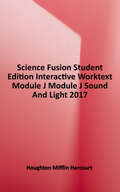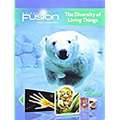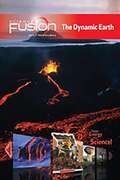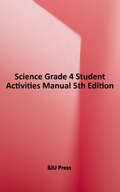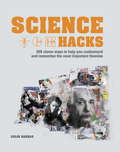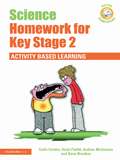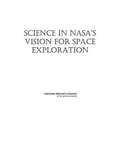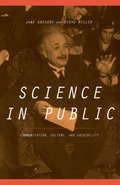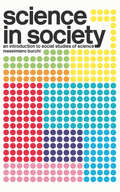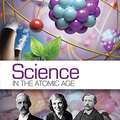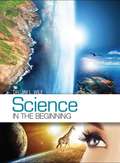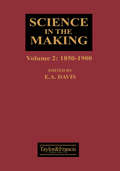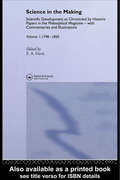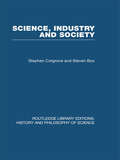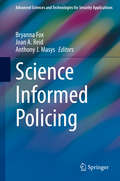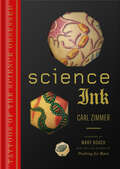- Table View
- List View
Science Fusion: Student Edition Interactive Worktext Module J Module J: Sound And Light 2017 (ScienceFusion Ser.)
by Marjorie Frank Michael R. Heithaus Michael A. DiSpezioNIMAC-sourced textbook
Science Fusion: Student Edition Interactive Worktext Module J Module J: Sound and Light 2017 (Sciencefusion Ser.)
by Houghton Mifflin HarcourtThis textbook companion effectively teaches all the important light and sound-related concepts.
Science Fusion: The Diversity of Living Things
by Michael Dispezio Marjorie FrankLearn about life over time and earth's organisms in this great science book.
Science Fusion: The Dynamic Earth [Grade 6-8 Volume E]
by Marjorie Frank Michael R. Heithaus Michael A. DispezioNIMAC-sourced textbook
Science Grade 2 Student Text (BJU Press Science Series)
by Bju PressBJU Science 2 will get kids into the world of science! Twelve chapters cover the basics of science, living things, plants, fossils, the earth, natural resources, light, matter, movement, the body, and more. Interesting, engaging chapters include diagrams, charts, captioned photographs, illustrations, and special interest boxes; each section ends with a "quick check" question to assess understanding, and each chapter ends with a hands-on activity. 204 pages with index and glossary. Grade 2. 4th Edition.
Science Grade 4 Student Activities Manual,
by Bju PressIn BJU Press Grade 4 Science 5th Edition, students will explore Life Science as they learn about plants, animals, and humans; Physical Science as they study energy, waves, light, and sound; and Earth Science as they cover water, natural hazards, and natural resources, all from a biblical perspective. The Student Activities book provides Investigation, Inquiry, Exploration, and STEM activities to engage students’ interest, reinforce learning, and assess understanding. Full-color pages combine graphic organizers and infographics with questions so students can practice and develop visual analysis and other science skills. Study guides for each chapter give systematic review of key concepts, and “Think About It” sections offer application opportunities.
Science Grade 5 (Michigan)
by SepupAn issues based program customized to align to the Michigan Grade Level Content Expectations for Science Grade 5. This program uses several kinds of activities to teach life, earth and physical science concepts.
Science Grade 7: Mcdougal Littell Science South Carolina
by Mcdougal LittellIn this book you will see how scientific knowledge keeps growing and changing as scientists ask new questions and rethink what was known before.
Science Hacks (Hacks Ser.)
by Colin BarrasWith Science Hacks, you no longer need a PhD to understand the fascinating ideas behind science's greatest theories and discoveries. This latest addition to the ingenious new Hacks series will show you a technique for understanding and, crucially, remembering 100 of the most important and most interesting scientific theories from throughout the ages.On each topic, you'll start with a helicopter overview of the subject, which will give you an introduction to the idea and some context surrounding it. Next, you'll zoom in on the core elements of the theory, with clear explanation of each point to make sure you really understand the concept before finally, you'll be given a one-liner hack to really make the theory stick in your mind.Includes such topics and fields as:Particle PhysicsEvolutionary BiologyGeneticsMedicineChemistryEcology
Science Hacks (Hacks)
by Colin BarrasWith Science Hacks, you no longer need a PhD to understand the fascinating ideas behind science's greatest theories and discoveries. This latest addition to the ingenious new Hacks series will show you a technique for understanding and, crucially, remembering 100 of the most important and most interesting scientific theories from throughout the ages.On each topic, you'll start with a helicopter overview of the subject, which will give you an introduction to the idea and some context surrounding it. Next, you'll zoom in on the core elements of the theory, with clear explanation of each point to make sure you really understand the concept before finally, you'll be given a one-liner hack to really make the theory stick in your mind.Includes such topics and fields as:Particle PhysicsEvolutionary BiologyGeneticsMedicineChemistryEcology
Science Homework for Key Stage 2: Activity-based Learning (Active Homework)
by Colin Forster Vicki Parfitt Andrea McGowanScience Homework for Key Stage 2 is a unique resource for busy teachers - a selection of ‘pencil-free’, hands-on activities, aligned with the National Curriculum Programmes of Study and with clear links to the topics set out in the QCA scheme of work for KS2 science, that teachers can use as extension activities or give to pupils as homework to do with members of their family or friends. Each of the activities encourages the pupils to learn through discussion and through practical activities utilising everyday resources. Each activity is quick and easy for pupils and teachers to manage, and includes: a learning aim, full, clear instructions and discussion points tasks to foster collaboration and partnership between pupils, parents and teachers photocopiable resources. A refreshing approach for teachers and pupils, these activities will foster enthusiasm for learning and inspire pupils' interest in science.
Science Horizons
by Silver Burdett GinnScience is a way to ask and answer questions about the world. It is a way of learning about the world around you. Plants, animals, matter, energy, the earth, and space are part of the world around you.
Science In Nasa's Vision For Space Exploration
by National Research Council of the National AcademiesIn January 2004, President Bush announced a new space policy directed at human and robotic exploration of space. The National Academies released a report at the same time that independently addressed many of the issues contained in the new policy. In June, the President’s Commission on Implementation of United States Space Exploration Policy issued a report recommending that NASA ask the National Research Council (NRC) to reevaluate space science priorities to take advantage of the exploration vision. Congress also directed the NRC to conduct a thorough review of the science NASA is proposing to undertake within the initiative. This report provides an initial response to those requests. It presents guiding principles for selecting science missions that enhance and support the exploration program. The report also presents findings and recommendations to help guide NASA’s space exploration strategic planning activity. Separate NRC reviews will be carried out of strategic roadmaps that NASA is developing to implement the policy.
Science In Public: Communication, Culture, And Credibility
by Jane Gregory Steven MillerDoes the general public need to understand science? And if so, is it scientists' responsibility to communicate? Critics have argued that, despite the huge strides made in technology, we live in a "scientifically illiterate" society--one that thinks about the world and makes important decisions without taking scientific knowledge into account. But is the solution to this "illiteracy" to deluge the layman with scientific information? Or does science news need to be focused around specific issues and organized into stories that are meaningful and relevant to people's lives? In this unprecedented, comprehensive look at a new field, Jane Gregory and Steve Miller point the way to a more effective public understanding of science in the years ahead.
Science In Society: An Introduction to Social Studies of Science
by Massimiano BucchiThe world around us is continually being shaped by science, and by society’s relationship to it. In recent years sociologists have been increasingly preoccupied with the latter, and now in this fascinating book, Massimiano Bucchi provides a brief introduction to this topical issue. Bucchi provides clear and unassuming summaries of all the major theoretical positions within the sociology of science, illustrated with many fascinating examples. Theories covered include Thomas Kuhn's theory of scientific change, the sociology of scientific knowledge, actor-network theory, and the social construction of technology. The second half of the book looks at recent public controversies over the role of science in the modern world including:* the Sokal affair, otherwise known as the science wars* debates over public understanding of science, such as global warming and genetically modified food* the implications of the human genome project. This much needed introduction to a rapidly growing area brings theory alive and will be essential reading for all students of the sociology of science.
Science In The Atomic Age
by Dr Jay L. WileThis laboratory-based, middle school science course covers a wide range of topics that are of interest to modern scientists. It starts by describing our current understanding of atoms, molecules, the chemicals that are necessary for life, DNA, and cells. These topics are all discussed in the context of history, explaining how specific scientific advances led to the scientific explanations that the students are being taught. This allows students to learn not only the current scientific understanding of these topics, but also how scientists reached that understanding. The course then uses what the student has learned to describe the living world. It discusses the levels of organization found in creation and spends time discussing topics at each level. As a result, students learn how cells work together to make tissues, how tissues come together to make organs, how organs form organ systems, how those organ systems produce organisms, and how those organisms relate to one another in populations and communities. Throughout the course, God's design in nature is highlighted, and topics in the creation/evolution debate are discussed.
Science In The Beginning
by Dr Jay L. WileStudents will love the hands-on activity that begins each lesson. Most are experiments (that have been field-tested for homeschoolers!), and include step by step directions to keep you on track. As this curriculum was designed for all elementary-aged students to use together, the main lesson text takes a conversational, easy-to-read tone that all students can comprehend; illustrations and photographs are integrated throughout. Review assignments close the lesson; questions are grouped for "youngest, older, and oldest" students. Students are instructed to keep a notebook, and the activities include both drawing and writing type notebook assignments. For evaluation, the notebook or oral questions can be used; tests are not included, but are in the Helps & Hints book (sold-separately).
Science In The Making: 1850-1900
by E. A. DavisVolume Two of the Science in the Making Series covers the scientific advancements of the day between 1850 and 1900 as reported in the Philosophical Magazine. This period culminated with the discovery of the electron, Xrays and radioactivity. This beautifully produced volume contains facsimiles of original papers by eminent scientists including Kelv
Science In The Making: Scientific Development As Chronicled Historic Papers In The Philosophical Magazine, with commentaries and illustrations
by Luis JimenezThis text celebrates, in four volumes, the bicentenary of the "Philosophical Magazine" and chronicles the history of scientific development as chonicled in its pages. Each volume previews a 50 year period and contains not only classical works but also papers of an amusing controversial nature. Commentaries preceding each part set the pa
Science Industry and Society: Studies in the Sociology of Science (Routledge Library Editions: History & Philosophy of Science)
by Stephen and Cotgrove & BoxOriginally published in 1970. Two major changes have characterised science in the twentieth century. Firstly, there has been its rapid growth. Secondly, and central to the theme his book – science is no longer mainly an academic activity carried on in universities. Industry will soon be the largest employer of scientists. This book deals with issues of bureaucracy in science threatening its creativity and the failure of industry to recruit the best graduates, as well as what attracts people to study science.
Science Informed Policing (Advanced Sciences and Technologies for Security Applications)
by Anthony J. Masys Bryanna Fox Joan A. ReidThe current policing landscape has seen the rise in serious and organized crime across the globe. Criminals are innovating in real-time leveraging cyber, social media, enhanced surveillance to support their activities. In so doing, the criminal landscape has become transnational whereby collaborative networks have flourished thereby creating greater complexity and novel threats for the international policing community. As new threats to local, regional, national and global security are emerging, leveraging science and technology innovations has become more important. Advances in big data analytics, cyber forensics, surveillance, modeling and simulation has led to a more data driven, hypothesis generated and model informed approach. Novel science and technology innovations are presented in this edited book to provide insights and pathways that challenges the emerging and complex criminal threat landscape by supporting policing operations.
Science Ink: Tattoos of the Science Obsessed
by Carl ZimmerBody art meets popular science in this elegant, mind-blowing collection, written by renowned science writer Carl Zimmer. This fascinating book showcases hundreds of eye-catching tattoos that pay tribute to various scientific disciplines, from evolutionary biology and neuroscience to mathematics and astrophysics, and reveals the stories of the individuals who chose to inscribe their obsessions in their skin. Best of all, each tattoo provides a leaping-off point for bestselling essayist and lecturer Zimmer to reflect on the science in question, whether its the importance of an image of Darwins finches or the significance of the uranium atom inked into the chest of a young radiologist.
Science Insights: Exploring Earth and Space
by Michael Anthony Dispezio Gerald Skoog Bobbie Sparks Marilyn Linner-Luebe Marilyn LisowskiReading a science textbook is not like reading a magazine or a story. You usually don't have to work hard to understand a story. You probably won't remember it for a long time, either. But when you read science, you are reading to learn something new. You will need to think about what you read. You will also need to remember as much as you can. You may just read a story, but you will need to study your textbook.
Science Insights: Exploring Living Things
by Michael Dispezio Marylin Lisowski Gerald Skoog Bobbie Sparks Marilyn Linner-LuebeA science book that covers cells, heredity, evolution, classification, simple organisms, plant life, animal life, human life and ecology.
Science Insights: Exploring Matter and Energy
by Michael Dispezio Marylin Lisowski Gerald Skoog Bobbie Sparks Marilyn Linner-LuebeThe textbook explores such aspects of matter and energy as heat, electricity, and nuclear chemistry, with suggested activities and review questions at the end of each chapter.
